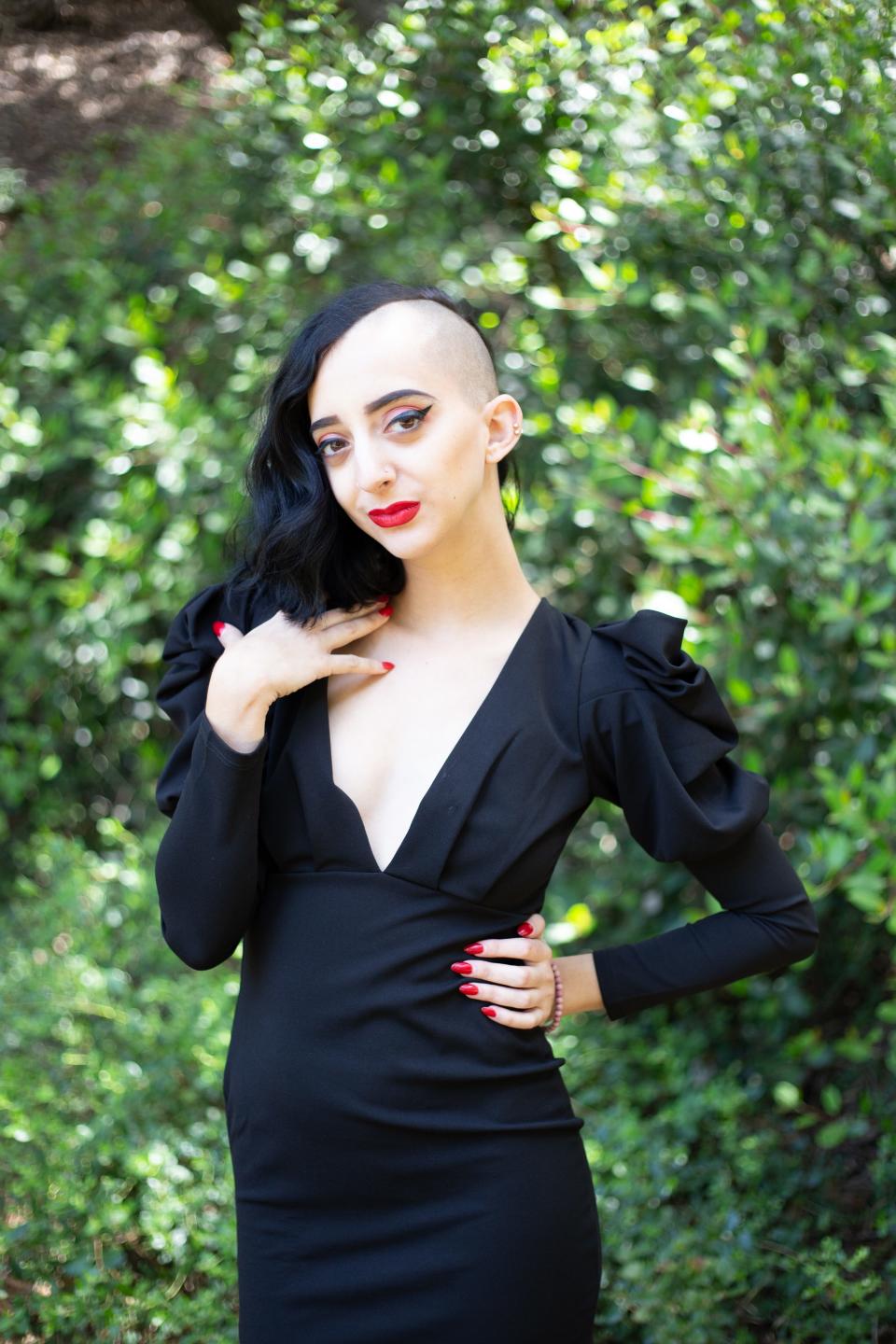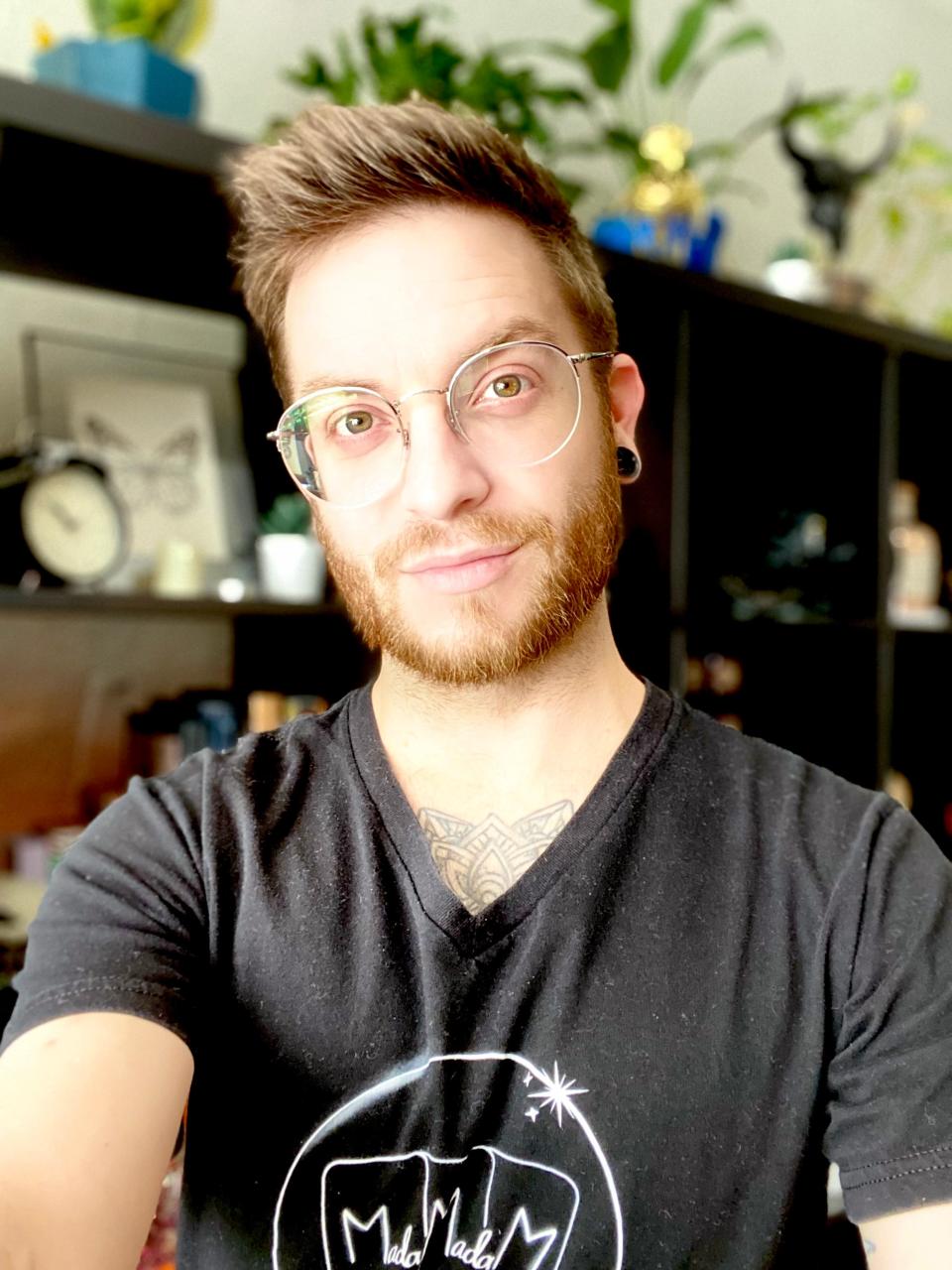What's the deal with WitchTok? We spoke to creators bringing magic to TikTok.

Kiley Mann was 10 when she was gifted her first set of runes, a Nordic divination tool, which sparked a lifelong journey into witchcraft.
"I've been studying spirituality and religion for about a decade now," she says, explaining witchcraft for her is the duality of both.
Now 19, Mann shares what she's learned with her 883,000 TikTok followers, from divination forms like tea leaves to working with tarot cards, runes and bone throwing.
Known by the username @oracleofthemoon, she is one of many TikTok users part of WitchTok, a niche section of the video-sharing app that revolves around magic and witchcraft. The hashtag #witchtok alone has amassed more than 19.8 billion views.
Why has it become so popular? We spoke to some of the personalities behind WitchTok to find out.
How WitchTok creators got started
Adam Wethington, 33, has been doing tarot since he was 15, but after losing his job at the start of the pandemic, he turned to readings as a form of income. He joined TikTok in December as a way to share his skills and is now known as Madam Adam to his 1.5 million followers, a reclamation of the "bully name that I got as a kid."
Wethington, whose pronouns are he/they, says their content, which has now become their full-time job, comes "from a level of truth that I think is resonant with a lot of people."
"I come at it in a way that some people call brutal honesty," they add. "I call it tough love."
Mann, a full-time fine arts student whose pronouns are she/they, first started a TikTok account as a way to share their Etsy business, where they sell magical tools from crystals to herbs and homemade protection salts. The more their account grew, "the more comfortable I felt in solidarity to share more about my own practice, and it just kind of took off from there."

Honey Rose, 23, first got into tarot three years ago and has been studying magic ever since. Rose began their TikTok account under the username @thathoneywitch about six months before COVID-19 hit, reaching around 40,000 followers by February 2021. Now more than 124,000 people follow Rose's account, which they manage while also pursuing a Masters degree in forensic science full time.
While they sell tarot readings and ceramic cauldrons on the side, they've mostly found joy in the community by making friends they're "going to keep for a really long time."
Why WitchTok is so popular
WitchTok is a thriving community of creators who share a common link of magic and witchcraft.
Wethington describes it as a "fabulous TikTok community of spiritualists... from all different walks of life." He believes part of its popularity comes from the sense of control it can provide people during uncertain times brought on by the coronavirus pandemic.
"WitchTok content is so relevant right now because we learned last year we can't control (things). All you can control is what you do, all you can control is what you think is truth in the world," Wethington explains. "We're in this great spiritual renaissance of enlightenment... Many of us are looking inward."
In addition to control, turning to spiritual practices during unprecedented times can also provide a sense of purpose, says Gabriela Herstik, author of "Inner Witch: A Modern Guide to the Ancient Craft."

"We live in this very intense, dark age... People want purpose, and they want connection," she says. "But beyond that, they want something that helps them connect to something larger than themselves. Something that helps them feel like there's a purpose, and magic does that. Magic is a way to align with your purpose, your power."
People who have been historically ostracized by religious institutions, such as those who identify as LGBTQ+, may also find community in this form of spirituality.
"I definitely think that if there's any queer people that are seeking spirituality, you don't have to call it 'witchcraft,' that's fine... But there are definitely spiritual things for you," says Wethington, who grew up Catholic before turning to witchcraft. "It's really a great opportunity for you to feel like you're connected to something real and grounded."

Rose echoes the refuge that marginalized groups can find in this community, sharing their own intersection of identities.
"I am a lot of marginalized groups. I am nonbinary, I'm queer and I'm half-Black... but magic has been the voice of people that are voiceless for a very long time," they explain. "Some people have a problem with traditional religions and traditional spirituality, as sometimes they go towards a more abstract form of spirituality, which can be witchcraft."
Herstik believes WitchTok's growth is also due to the accessibility it brings to these topics.
"I've been writing about witchcraft for seven or eight years at this point, and I've seen it come up as a super powerful force in the in the Zeitgeist," she says, remembering when "being witchy" and "looking witchy" started to become trendy years ago, from tarot decks being sold in Urban Outfitters to "American Horror Story: Coven."
"Seeing it on TikTok was not very shocking. It just feels like a natural progression of what people have been really yearning for, which is accessible information around these esoteric topics that at any other point in history, before the internet, were super guarded and super hard to access."
Mann agrees that while it's always been popular within certain communities, TikTok brings a "certain visibility," making people more "curious about what it's all about and how it can apply to their own lives.
"What makes people so curious about it is that this information was once regarded as kind of taboo, but now it's become more open to the general public," they add.
More: Witchy fashion is 2017's most exciting, subversive trend
Witchcraft's cultural roots
While WitchTok is rising in popularity, witchcraft itself is not a trend. Instead, it's been around for centuries and practiced by different groups around the world.
From hoodoo spiritually rooted in traditional African religions and Latin American and Afro-Caribbean practices known in Spanish as brujería, to religions like Vodou and Wicca, having endless things to learn about is part of what kept Mann intrigued at the beginning of her journey with magic.
"It's a community that's filled with knowledge, and there's just always new things you can learn about yourself, about others, about different cultures and religions is infinite," Mann said.
Mann adds that witchcraft is also much more diverse than you may see on TikTok: "Witchcraft by some name exists in virtually every culture, and everybody practices it differently, and most of the time what you see on the internet or on WitchTok is just the tip of the iceberg."
As a half-Black, half-Italian WitchTok creator, Rose has found comfort in connecting with their ancestors through magic.
@thathoneywitch ##witchtok ##witch ##pocwitch ##blackwitch ##ancestors ##ancestorwork ##ancestorveneration ##FlauntItChallenge ##BillboardNXT ##HowIBathAndBodyWorks ##fy ##foryou
♬ original sound - karebearsk8
They also agree in doing research to show appreciation and not appropriation towards certain practices.
"There's often the issue of cultural appropriation, and I've had to deal with that. Some people don't want to listen to people from those cultures, with their knowledge, they just don't want to listen, because they want to keep doing what they're doing." they add, pointing to issues surrounding white sage and dreamcatchers being used when the origins are rooted in indigenous cultures and practices.
It also helps to listen to witches and practitioners of color who speak to these topics. For example, in one of Rose's early videos, they explained the harm in using the term "black magic" to describe dark or evil magic.
Mann hopes WitchTok empowers people of different communities to share their stories.
"I think it's bringing more visibility to people of color, people of different religions, indigenous people, I think it's definitely allowing more worldly views to be shared and observed and respected," they say.
This article originally appeared on USA TODAY: TikTok: WitchTok has billions of views. Witches explain why.

